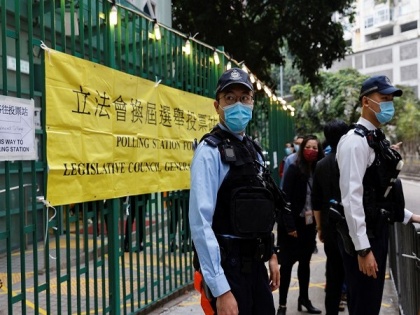Hong Kong's media is a changing landscape, no one knows where the 'red lines' lies: Report
By ANI | Published: December 27, 2021 12:12 PM2021-12-27T12:12:57+5:302021-12-27T12:20:03+5:30
China controlled government's implementation of the National Security Law has upended Hong Kong's political environment in the past year, according to several media reports.

Hong Kong's media is a changing landscape, no one knows where the 'red lines' lies: Report
China controlled government's implementation of the National Security Law has upended Hong Kong's political environment in the past year, according to several media reports.
The city authorities now view political participation as subversive, and the authorities are targeting many across a broad cross-section of the population under the new law.
The Foreign Correspondents' Club (FCC) last month had revealed a survey of correspondent and journalist members on a wide range of issues related to press freedom since the implementation of the National Security Law in June 2020.
The survey said that the vast majority of respondents reported an overall deterioration in the working environment for journalists, noting, in particular, the unwillingness of sources to be quoted and the need for reporters to self-censor their writing or delete images.
In 2021, Hong Kong authorities interfered with peaceful civil society activities, demonstrating a Mainland-style "rule by law" approach in which the law is merely a means to the political end of suppressing dissent, according to the US-China Economic and Security Review Commission.
The Hong Kong government and pro-Beijing entities have used several tactics to strip Hong Kong media organizations of their independence, mimicking the Mainland's heavily constrained media environment.
Earlier in June, Hong Kong authorities froze USD 2.32 million in assets belonging to Apple Daily and two affiliated companies, leaving the publisher with funds for only a few days. Lacking any means of paying the salaries of its 1,300 employees or covering normal operating costs, the paper had no choice but to shut down.
Partnerships with Chinese state media are another tactic the government has deployed successfully to interfere with independent media, the report said.
Later in August, Chief Executive Lam announced Hong Kong's state-funded broadcaster Radio Television Hong Kong (RTHK) would partner with China Media Group, the holding group for PRC state media firms China Central Television and China Radio International, to air "patriotic" content.
According to Chief Executive Lam, the agreement allows RTHK's Chinese-language channel to air Mainland-produced content and produce its own programming to advocate for "safeguarding national security" and "promote a better understanding of developments on the Mainland."127
This ensures the promotion of the CCP's preferred political narratives. Reporters Without Borders described this partnership as providing a "perfect pretext to force RTHK to distribute Chinese propaganda."
According to the review commission report, the CCP has taken direct control of Hong Kong-based media in order to influence the tone of ostensibly independent organizations.
The Chinese government has increased control of media entities through other sweeping purchases in the recent past. The Central Liaison Office, Beijing's official representative office in Hong Kong, gained control of 80 per cent of Hong Kong's publishing industry when it purchased Sino United Publishing Ltd. in 2015.
Having solidified control over the majority of print publications and many online sources in the city, the Chinese government can ensure messaging in textbooks and papers supports its goals, the report added.
Journalists are left uncertain about what will get them in trouble with the authorities, veteran journalist Eric Wishart told Voice of America (VOA) earlier this year. "We talk about the 'red lines' in Hong Kong, but the paint is still fresh," Wishart said. "It is a changing landscape, and that is a big, big challenge for everybody."
( With inputs from ANI )
Disclaimer: This post has been auto-published from an agency feed without any modifications to the text and has not been reviewed by an editor
Open in app